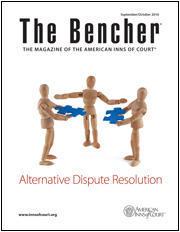Fee Dispute Arbitration or Mediation
The Bencher—September/October 2016
By John P. Ratnaswamy, Esquire

 The American Bar Association’s Model Rules of Professional Conduct (1) recognize that arbitration of a fee dispute between lawyer and client may be subject to mandatory arbitration or meditation in some jurisdictions and (2) encourage the lawyer to consider fee arbitration or mediation in other jurisdictions.
The American Bar Association’s Model Rules of Professional Conduct (1) recognize that arbitration of a fee dispute between lawyer and client may be subject to mandatory arbitration or meditation in some jurisdictions and (2) encourage the lawyer to consider fee arbitration or mediation in other jurisdictions.
Model Rule of Professional Conduct 1.5 is the central rule on fees. Rule 1.5 sets forth various requirements and prohibitions regarding fees without directly addressing fee disputes, although it does contain some brief language on changing fee arrangements. Rule 1.5’s Comment 9, “Disputes over Fees”, however, does address the subjects of fee arbitration and mediation.
Comment 9 states:
If a procedure has been established for resolution of fee disputes, such as an arbitration or mediation procedure established by the bar, the lawyer must comply with the procedure when it is mandatory, and, even when it is voluntary, the lawyer should conscientiously consider submitting to it. Law may prescribe a procedure for determining a lawyer’s fee, for example, in representation of an executor or administrator, a class or a person entitled to a reasonable fee as part of the measure of damages. The lawyer entitled to such a fee and a lawyer representing another party concerned with the fee should comply with the prescribed procedure.
The web page of the ABA’s Standing Committee on Client Protection contains several resources relating to fee arbitration and mediation. Their general page with materials on fee arbitration is on their website.
The page contains links to:
- four surveys on fee arbitration programs conducted from 1999 to 2013;
- a June 2015 chart of jurisdictions with mandatory fee arbitration programs (although note that the chart contains some disclaimers);
- a directory of fee arbitration programs; and
- the ABA’s Model Rules for Fee Arbitration (adopted by the ABA’s House of Delegates in February 1995).
- The ABA Model Rules of Professional Conduct and Model Rules for Fee Arbitration are just that, model rules, of course.
A separate question is whether or when a lawyer may, or should, propose a written fee agreement that includes a fee dispute resolution clause. The website of the American Arbitration Association includes a 2010 article entitled “Should Your Firm’s Engagement Letter Contain an Arbitration Clause”. I was not able to find a way to directly link to the article, but if you go to the AAA’s home page and enter “lawyer fees” (without the quotation marks) into the Search box, the article is one of the search results. The article, in brief, mentions factors including, among others, the nature of the firm’s clients and matters and the policy of the firm’s malpractice insurance carrier regarding fee arbitration.
In 2002, the ABA’s Standing Committee on Ethics and Professional Responsibility issued its Formal Opinion 02-425, “Retainer Agreement Requiring the Arbitration of Fee Disputes and Malpractice Claims”. The Opinion’s Conclusion states: “It is ethically permissible to include in a retainer agreement with a client a provision that requires the binding arbitration of fee disputes and malpractice claims provided that (1) the client has been fully apprised of the advantages and disadvantages of arbitration and has been given sufficient information to permit her to make an informed decision about whether to agree to the inclusion of the arbitration provision in the retainer agreement, and (2) the arbitration provision does not insulate the lawyer from liability or limit the liability to which she would otherwise be exposed under common and/or statutory law.” A number of state bar ethics opinions also have addressed this subject, and they have reached varying conclusions.
A lawyer considering her obligations and options with respect to seeking arbitration or mediation of a fee dispute as a term of a retention agreement or when a dispute arises or appears that it may arise should consider the laws of the application jurisdiction(s). Please note that in some jurisdictions, there are relevant statutes as well as court directives and guidance.
John P. Ratnaswamy, Esuire, is a partner in the Chicago law firm of Rooney Rippie & Ratnaswamy LLP. He also serves as an Adjunct Professor of Legal Ethics at the Northwestern University School of Law. This column should not be understood to represent the views of any of those entities or John’s or the firm’s current or former clients.
© 2016 JOHN P. RATNASWAMY, ESQ. This article was originally published in the September/October 2016 issue of The Bencher, a bi-monthly publication of the American Inns of Court. This article, in full or in part, may not be copied, reprinted, distributed, or stored electronically in any form without the express written consent of the American Inns of Court.